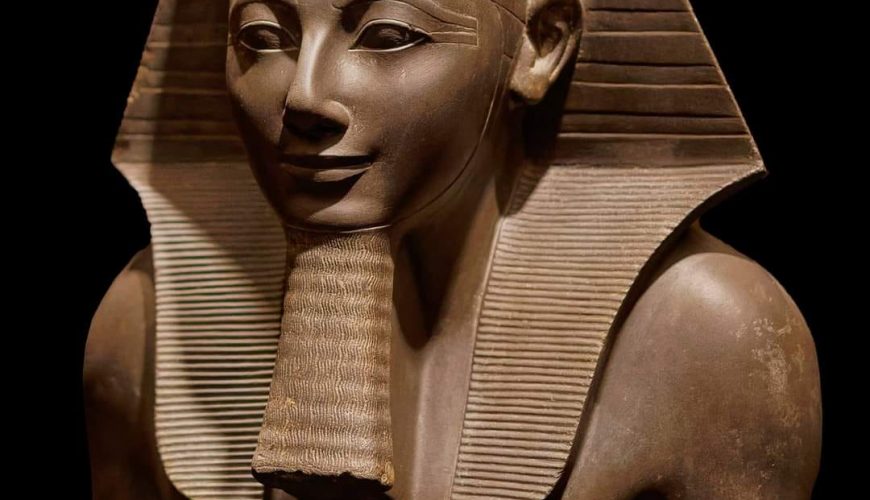The statue of King Tuthmosis III from the Luxor Museum is in the centre of the belt that connects the royal dress, the Shendit, the name of the king.
King Tuthmosis the third is considered one of the most important kings of ancient Egyptian history, specifically the Eighteenth Dynasty. There are many rumours and opinions about his struggle with Hatshepsut, but the most important thing for us is that he came to power while he was well aware of the martial arts thanks to his claim by Hatshepsut in a military school. He learns martial arts and strength, but the most important thing is that thanks to that, he became an Egyptian emperor who understood and was well aware of the arts of wars and fighting, especially his most famous wars, the Battle of Majdou.
Before the Battle of Majdoo: –
In the late era of Hatshepsut, many Asian states began to rebel against the Egyptian rule, and this allowed them to not interest Queen Hatshepsut in Asian foreign affairs, but rather in African affairs and the consolidation of relations between them and the Asian rebellion against Egyptian rule was not individual but was an organized conspiracy against Egyptian sovereignty in Asia, which was led by Amir Kadesh, who charged the issuance of the Asian states towards Egyptian sovereignty, in addition to that, the Armenian state of Mitanni was supporting this rebellion, fearing the penetration of Egyptian influence in Asia, fearing for its interests.
The alliance did not stop at the Asian states, but rather another party, like the tiger, was waiting for its prey to be criticized, namely the Hyksos who were expelled by Ahmose I and some of them fled to Asia, so they began to plot plots and ignite crises against the Egyptian influence in Asia after Hatshepsut neglected Asian foreign affairs. They expanded with what they possessed of power, so he gathered the Asian tribes under the leader of Kadesh, and their number reached 330 princes. They rushed to occupy the fortress of Majdoua, which indicates the presence of the Hyksos is the text of King Thutmose III and says about himself (He fought the Hyksos who attacked).
Choosing Majdoua fort is because the city of Majdoua was a war centre and a natural barrier to the Egyptian army. After all, it was located between the mountain range of Lebanon.
The events of the battle as stated in the texts of the king: –
When Tuthmosis the Third took power, the Asian peoples openly showed their opposition to the king, and this is evident in the king’s war texts saying, “Starting from Barza (north of Judea near the coast of Palestine) to the swamps of the river (Euphrates), they went out on Sultani and split the stick of obedience on me.” The Egyptian texts also mentioned The king departed from the military base of Tharu in the eastern delta and shrouded his army, and took the warrior road of Horus in the first year of his rule, and his goal, as stated in the texts, was “to defeat the vile enemy, and to extend the borders of Egypt according to the orders of Abiy Amun” and arrived in Gaza in Nine days, and then to heat in ten days. Thus, Thutmose III arrived with his army at Mount Carmel. The number of his army ranged from 10 to 15 thousand; most of them were infantry.
After the king reached Mount Carmel, he met with the members of his war council to consult them on what way would be better for him to take than three ways to reach the enemy. He said to them: “The vile enemy in Kadesh has entered Majdoua while he is there at this moment, and he was able to join him with the princes of lands loyal to Egypt until Two rivers, from Syrians with their horses, soldiers and people, and they are fighting in glory, so what do you see?
The best of them is among the three ways to reach Megiddo from around the Saffron of Mount Carmel: –
1- Tanakh Road, which is eight kilometres southeast of Majdoua
2- The second is the road north of the town of Jifni
3- As for the third road, the road of Aaruna, which is the most difficult road in terms of area, is confined between the branches of the Carmel Mountains and does not accommodate more than one vehicle, but it is closer and leads directly to the glory.
The other two roads are broad but deviate a little from Glory.
The council of Thutmose III felt that the king wanted to take the narrow path, so they said to him, “How can a person walk on this very narrow path?” They also feared that the enemy had ambushed them and occupied the heights of the narrow road, so they also said to the king, “There is news that the enemies are still In the desert, they outnumber the confinement, and then it will not be possible for a horse to walk next to another horse on this road in addition to that the enemies can attack the front of the army and the front of the army is confined, and on the other hand the rear of the army does not fight, and there are two other roads, the first one opens to Tanakh and the other from my eyelids And both of them lead us to Majdoo, so that our Master should not follow any path he pleases from these two paths, and he does not let us continue along this bumpy path. ”Thus, we see the opinion of the leaders, which is not to walk in the narrow path of our disgrace, and they left the king to choose—shame on us for the surprise of the enemy. The Egyptian army takes two broad roads in the normal way, so the enemy ambushes on these wide roads. Thus, Thutmose III saved the Egyptian army from perdition by taking the narrow path, and his wisdom also appeared in advance of the Egyptian army while on the way. On the narrow, bumpy road, to reassure its soldiers and reassure them, he crossed the road successfully in a whole day without being noticed by the enemy forces who set up ambushes for the Egyptian army on the two broad roads.
Thutmose III surprised the enemy’s army and attacked them while he was at the head of the army. Then the enemy retreated, and panic reigned in them, and their army was scattered. There were confusion, randomness and fear due to the good organization, speed of reaction and fighting skill of the Egyptian army. After the victory over the Asian army, the Egyptian soldiers were happy because of the flight of soldiers. The Asians left the many spoils behind. The Egyptian army won a great victory under the leadership of Emperor Thutmose III.


Comment (0)